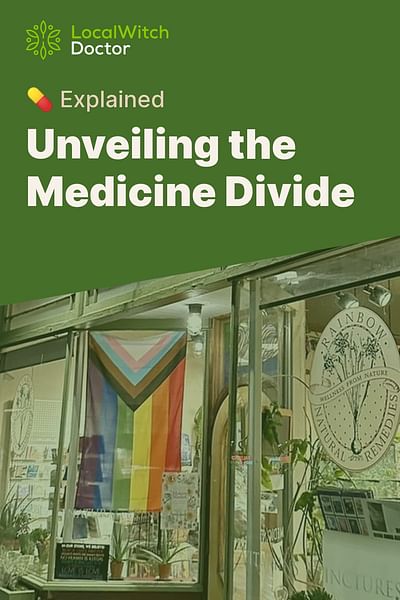Matilde O'Reilly is a distinguished herbalist boasting more than 20 years of hands-on experience in the realm of natural healing. Her journey has taken her across the globe, studying with various traditional cultures to gain insight into their unique herbal remedies. Matilde is celebrated for her profound comprehension of plant energies, and her exceptional skills in crafting potent tinctures.
Dear reader,
Thank you for reaching out with this important question about complementary and alternative medicine. Understanding the difference between these two approaches can help you make informed decisions about your health and well-being.
Complementary and alternative medicine (CAM) are often used interchangeably, but they do have distinct differences. Let me break it down for you:
Complementary Medicine:
Complementary medicine refers to practices and therapies that are used alongside conventional medical treatments. It is meant to complement and enhance the effectiveness of mainstream medicine. The goal of complementary medicine is to support the body's natural healing processes and promote overall well-being.
Examples of complementary medicine include acupuncture, massage therapy, chiropractic care, and herbal medicine. These practices are often used to alleviate symptoms, reduce stress, and improve quality of life. Complementary medicine recognizes the importance of addressing the whole person - mind, body, and spirit - in order to achieve optimal health.
Alternative Medicine:
Alternative medicine, on the other hand, refers to practices and therapies that are used in place of conventional medical treatments. It is an alternative approach to mainstream medicine, focusing on natural remedies and holistic healing methods. Alternative medicine often emphasizes the body's ability to heal itself and aims to treat the root cause of illness rather than just the symptoms.
Examples of alternative medicine include homeopathy, naturopathy, Ayurveda, and traditional Chinese medicine. These practices may involve the use of herbs, supplements, dietary changes, and lifestyle modifications to promote healing and restore balance in the body.
The main difference between complementary and alternative medicine lies in their relationship to conventional medicine. Complementary medicine works alongside mainstream treatments, while alternative medicine is used as a substitute for conventional treatments.
It's important to note that both complementary and alternative medicine can have their benefits and limitations. Some people find great success in combining conventional and complementary approaches, while others may choose to solely rely on alternative methods. The key is to find what works best for you and to always consult with qualified healthcare professionals before making any decisions.
In conclusion, complementary medicine complements conventional treatments, while alternative medicine is used as an alternative to mainstream medicine. Both approaches have their merits, and it's up to you to explore and find the best path for your own health journey.
If you're interested in incorporating herbal remedies into your complementary or alternative medicine practices, I invite you to explore the rest of our website. We have a wealth of information on the benefits of herbs in medicine, using tinctures in complementary medicine, and the best herbal recipes for health.
Wishing you vibrant health and wellness on your journey,
Morgana Greenleaf










